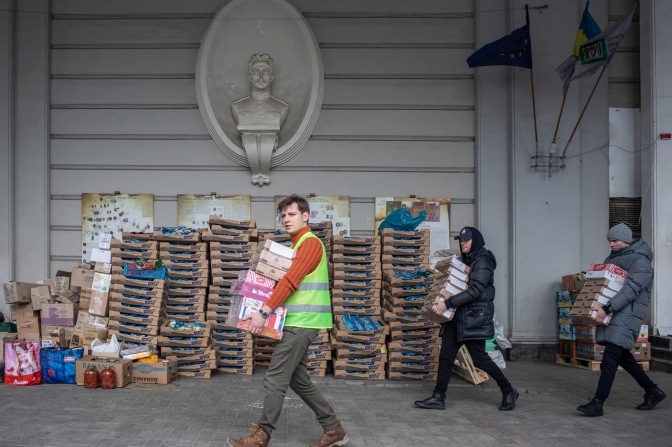
photo: oleksandr khomenko
[For urgent updates please follow Ukrainian Freedom News on Telegram]
Destroy volunteer centers – such calls Russian telegram groups made in recent days. Russia has realized that not only the state but also volunteers play a powerful role in supplying the military, and is seeking to find their centers. Of course, one can laugh that Russians do not understand the nature of volunteering and that centers, hierarchy, and the phenomenon of self-organization are different things. Oksana Dashchakivska, a candidate of political science and lecturer at Ukrainian Catholic University, explains what is happening in the relations between self-organized volunteer groups and the state.
Volunteers are people of good will who devote their time and other resources to a good cause. And if in the United States, volunteers are people who are on duty in schoolyards to ensure traffic safety, children who clean in the park, lawyers who provide free professional help, then in our country, volunteering is now associated with the army and humanitarian aid.
Martial law has been declared in Ukraine (which provides slightly wider opportunities for state institutions), and state institutions have also established a system of supply and management compared to 2014. Feeling stronger, the state claims to distribute the help collected by volunteers.
Read also: Help Ukrainian warriors through Lviv volunteers. Organisations and accounts for donations
Public institutions have a significant amount of data on the needs of both the military and the humanitarian and therefore can see the big picture, rather than each shelter or military unit individually. From this – they believe that they have the right to take from some to transfer to where more is needed.
Scandals and petty quarrels from different sides, which sometimes arise, show that the state is just learning to treat volunteer initiatives as equal partners, while volunteers are learning to trust the state. We already have cases of cooperation, the authorities help with letters, additional equipment, delivery. We need the state to behave not as a racketeer – «I take 10% of the goods», but as a good moderator.
Communication between local governments has also become new. Local governments in each community have created their own humanitarian headquarters. In larger communities utilities have become a working resource for such headquarters: they work with potential aid providers, they have become warehouses, shelters, sorting bases.
In small communities with fewer such institutions, local governments identify volunteer initiatives, take them under their wing and help organize work, or do not interfere and ask for some assistance to be distributed «along their own lines.» «Their own line» is a direct request from the mayor of another city for help. Even with something in stock, the community’s humanitarian headquarters wants assurances from local governments that such help is needed. At the same time, appeals of volunteers or public organizations directly to humanitarian headquarters are not always supported.
At the same time, volunteer initiatives, which have been working for 8 years to provide for the army or have had an experience of humanitarian aid in the previous phase of the war and maintained institutional capacity, responded much faster. Given this, they were the first to cover the military needs.
Instead, small volunteer groups and staff from local governments responded more quickly to the movement of refugees and their appearance in our cities.
There is a kind of volunteer market among volunteer groups: niches have been formed, you can see the uniqueness of each initiative, and therefore there will be more and more networking and umbrella initiatives, and the role of hubs is growing. Can humanitarian headquarters from the government become such hubs? Let’s see. So far, we can say that a model of cooperation between volunteer initiatives and government agencies is being formed. Volunteers seek to trust the state, expect it to be a moderator, not a racketeer. The state learns to work with volunteer initiatives, foundations, and organizations as equal partners.
By Oksana Dashchakivska, translated by Kateryna Bortniak
Follow us on Facebook and Instagram. Lviv Now is an English-language website for Lviv, Ukraine’s «tech-friendly cultural hub.» It is produced by Tvoe Misto («Your City») media-hub, which also hosts regular problem-solving public forums to benefit the city and its people.










